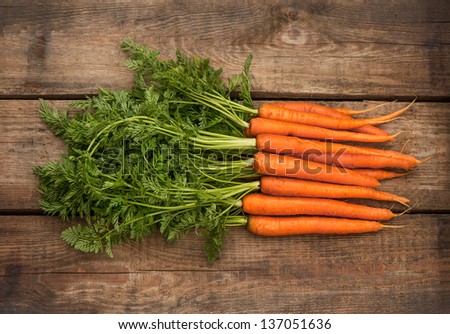Carrots are so common in the US that it's easy to overlook their potentially powerful benefits to your health. It is now a popular snack food to eat with dips or add to fresh vegetable juice, or as an addition to soups and stews. Carrots have been valued since ancient times for their medicinal properties.
According to the US Department of Agriculture:
"Thought to be native to central or western Asia (likely Afghanistan), cultivated carrots first arrived in North America with the early Virginia colonists. Carrots are an important member of the parsley family, which also includes celery, anise, and dill.

Like many vegetables, the early history of carrots centered on various medicinal attributes thought suitable for curing a wide range of conditions and maladies."
Beta-Carotene and More: What Nutrients Are Found in Carrots?
A serving of carrots (one medium carrot or ½ cup chopped) will provide about:
210% of the average daily recommended amount of vitamin A
10% vitamin K
6% vitamin C
2% calcium
The high vitamin A content, for which carrots are best known, comes from beta-carotene, which is converted into vitamin A in your liver. Interestingly, there's a reason why 'carrot' and 'carotene' sound so alike. The word carotene was devised in the early 19th century by a German scientist after he crystallized the compound from carrot roots.
Carrot seed oil also contains potassium, vitamin B6, copper, folic acid, thiamine and magnesium. I generally recommend eating carrots in moderation because they contain more sugar than any other vegetable aside from beets,
However, when eaten as part of an overall healthy diet, the nutrients in carrots may provide you with protection against heart disease and stroke while helping you to build strong bones and a healthy nervous system.
From Heart Disease to Cancer: What Does the Research Say About Carrots?
There's good reason to include carrots in your regular diet, as the science is very strong that they may help reduce your risk of chronic disease.
Heart Disease
Eating more deep-orange-colored fruits and vegetables is associated with a lower risk of coronary heart disease (CHD). In particular, carrots are associated with a 32 percent lower risk of CHD, leading researchers to conclude:
"… a higher intake of deep orange fruit and vegetables and especially carrots may protect against CHD."
The consumption of carrots has also been associated with a lower risk of heart attacks in women.
Cancer
Antioxidants in carrots, including beta-carotene, may play a role in cancer prevention. Research has shown that smokers who eat carrots more than once a week have a lower risk of lung cancer, while a beta-carotene-rich diet may also protect against prostate cancer.
The consumption of beta-carotene is also associated with a lower risk of colon cancer while carrot juice extract may kill leukemia cells and inhibit their progression.
Carrots also contain falcarinol, a natural toxin that protects carrots against fungal disease. It's thought that this compound may stimulate cancer-fighting mechanisms in the body, as it's been shown to cut the risk of tumor development in rats.
Vision
A deficiency in vitamin A can cause your eye's photoreceptors to deteriorate, which leads to vision problems. Eating foods rich in beta-carotene may restore vision, lending truth to the old adage that carrots are good for your eyes.
Brain Health
Carrot extract has been found to be useful for the management of cognitive dysfunctions and may offer memory improvement and cholesterol-lowering benefits.
Liver Protection
Carrot extract may help to protect your liver from the toxic effects of environmental chemicals.
Anti-Inflammatory Properties
Carrot extract also has anti-inflammatory properties and provided anti-inflammatory benefits that were significant even when compared to anti-inflammatory drugs like Aspirin, Ibuprofen, Naproxen and Celebrex.
Cooking May Increase the Health Benefits of Carrots
Carrots eaten raw are an excellent food, but there is some research showing that cooking them may actually help to boost their nutritional content. Interestingly, one study found that cooked carrots had higher levels of beta-carotene and phenolic acids than raw carrots, and the antioxidant activity continued to increase over a period of four weeks. Adding carrot peels to a carrot puree also boosted antioxidant levels.
So while I generally recommend eating your vegetables raw or fermented for the most nutrition, carrots may be one case where gentle cooking, such as steaming, is preferred.
As for storage, keep them in the coolest part of your refrigerator in a sealed plastic bag or wrapped in a paper towel, which should keep them fresh for about two weeks. Avoiding storing them near apples, pears or potatoes, as the ethylene gas they release may turn your carrots bitter.
Facts Source: mercola .com
According to the US Department of Agriculture:
"Thought to be native to central or western Asia (likely Afghanistan), cultivated carrots first arrived in North America with the early Virginia colonists. Carrots are an important member of the parsley family, which also includes celery, anise, and dill.

Like many vegetables, the early history of carrots centered on various medicinal attributes thought suitable for curing a wide range of conditions and maladies."
Beta-Carotene and More: What Nutrients Are Found in Carrots?
A serving of carrots (one medium carrot or ½ cup chopped) will provide about:
210% of the average daily recommended amount of vitamin A
10% vitamin K
6% vitamin C
2% calcium
The high vitamin A content, for which carrots are best known, comes from beta-carotene, which is converted into vitamin A in your liver. Interestingly, there's a reason why 'carrot' and 'carotene' sound so alike. The word carotene was devised in the early 19th century by a German scientist after he crystallized the compound from carrot roots.
Carrot seed oil also contains potassium, vitamin B6, copper, folic acid, thiamine and magnesium. I generally recommend eating carrots in moderation because they contain more sugar than any other vegetable aside from beets,
However, when eaten as part of an overall healthy diet, the nutrients in carrots may provide you with protection against heart disease and stroke while helping you to build strong bones and a healthy nervous system.
From Heart Disease to Cancer: What Does the Research Say About Carrots?
There's good reason to include carrots in your regular diet, as the science is very strong that they may help reduce your risk of chronic disease.
Heart Disease
Eating more deep-orange-colored fruits and vegetables is associated with a lower risk of coronary heart disease (CHD). In particular, carrots are associated with a 32 percent lower risk of CHD, leading researchers to conclude:
"… a higher intake of deep orange fruit and vegetables and especially carrots may protect against CHD."
The consumption of carrots has also been associated with a lower risk of heart attacks in women.
Cancer
Antioxidants in carrots, including beta-carotene, may play a role in cancer prevention. Research has shown that smokers who eat carrots more than once a week have a lower risk of lung cancer, while a beta-carotene-rich diet may also protect against prostate cancer.
The consumption of beta-carotene is also associated with a lower risk of colon cancer while carrot juice extract may kill leukemia cells and inhibit their progression.
Carrots also contain falcarinol, a natural toxin that protects carrots against fungal disease. It's thought that this compound may stimulate cancer-fighting mechanisms in the body, as it's been shown to cut the risk of tumor development in rats.
Vision
A deficiency in vitamin A can cause your eye's photoreceptors to deteriorate, which leads to vision problems. Eating foods rich in beta-carotene may restore vision, lending truth to the old adage that carrots are good for your eyes.
Brain Health
Carrot extract has been found to be useful for the management of cognitive dysfunctions and may offer memory improvement and cholesterol-lowering benefits.
Liver Protection
Carrot extract may help to protect your liver from the toxic effects of environmental chemicals.
Anti-Inflammatory Properties
Carrot extract also has anti-inflammatory properties and provided anti-inflammatory benefits that were significant even when compared to anti-inflammatory drugs like Aspirin, Ibuprofen, Naproxen and Celebrex.
Cooking May Increase the Health Benefits of Carrots
Carrots eaten raw are an excellent food, but there is some research showing that cooking them may actually help to boost their nutritional content. Interestingly, one study found that cooked carrots had higher levels of beta-carotene and phenolic acids than raw carrots, and the antioxidant activity continued to increase over a period of four weeks. Adding carrot peels to a carrot puree also boosted antioxidant levels.
So while I generally recommend eating your vegetables raw or fermented for the most nutrition, carrots may be one case where gentle cooking, such as steaming, is preferred.
As for storage, keep them in the coolest part of your refrigerator in a sealed plastic bag or wrapped in a paper towel, which should keep them fresh for about two weeks. Avoiding storing them near apples, pears or potatoes, as the ethylene gas they release may turn your carrots bitter.
Facts Source: mercola .com




